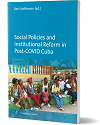Copyright header image: Ryderwear / created with canva.com
5 questions answered by Bert Hoffmann, Lead Research Fellow of the German Institute for Global and Area Studies
New with Budrich:
Social Policies and Institutional Reform in Post-COVID Cuba
by Bert Hoffmann (ed.)
About the book
The economic crisis in the wake of the COVID pandemic is putting Cuba’s socialism to a severe test. The government in Havana has added a fundamental reform of the economy, institutional structure and social policies to the agenda. This volume brings together contributions from leading international experts as well as from the island itself, analysing the economic, political, and social challenges Cuba is facing today.
Dear Bert Hoffmann, please summarize the content of your current publication “Social Policies and Institutional Reform in Post-COVID Cuba” for our readers.
Cuba’s current crisis forces the country to fundamentally rethink its social policies and institutional framework. In the past, health, education, and a dignified life for all were core social of Cuba’s socialist development model. However, today the deficient state economy does no longer provide salaries and pensions to cover daily needs, and new social protection mechanisms are discussed. Coinciding with the demise of the Revolution’s “historic generation” of leaders, the socialist government faces the uncharted waters of economic reform in a situation of profound social distress. Moreover, entering the post-Castro era also has made an overhaul of the country’s political institutions necessary. This includes the 2019 reform of the constitution but will not stop there. Recent outbursts of discontent have shown how deep social fissures are running, and the state will need to open new ways of interaction with the citizenry beyond the worn channels controlled by the Communist Party. The book brings together analyses of a broad range of the issues at stake, written by expert scholars from different disciplines and different perspectives, both from the island and from outside.
How did you develop the idea to edit this book?
With a group of scholars from Cuba and from Europe we saw the need to address the profound problems of social policy and Cuba’s institutional reform agenda. As a consequence, we started a two-year long process of writing and of discussing our papers – all online and by e-mail as the pandemic did not allow for the conference originally planned. But the process of commenting papers across countries and continents proved an excellent way of putting a book together whose profound and timely analyses make it an essential reading for all interested in where Cuba is heading.
From the perspective of your field of expertise, what are currently the greatest challenges for the Cuban economy and politics?
15 years ago, when Raúl Castro took over from his brother Fidel, he told Cubans that socialism on the island can only be sustained if it profoundly reforms. In his tenure he sketched an agenda of economic reform, but he implemented very little of it. This task is left to his successors – in circumstances that are very much worse. The pandemic, aside from its severe health effects and the pains of the lockdown measures, meant that Cuba’s principal economy – tourism – collapsed. The situation has become dire, provisions even of basic staples have become scarce, and the outbursts of discontent that took to the streets in July shows how much the fabric of Cuban society has been affected. So now, all must happen at once: serious, far-reaching economic reform; maintaining or re-inventing social protection for those in need; and, eventually, a process of political opening that establishes new ways for the pluralized Cuban society to get heard, to voice dissent, and to feel represented in the public institutions.
The pandemic situation is quite unpredictable worldwide. How will the pandemic affect Cuba in the long term? What future challenges do you see?
The pandemic has been a hit to the Cuban economy that will be painfully felt for many years. Moreover, the experience of seeing the country’s hospitals overwhelmed by the surge in COVID cases has shaken the confidence in the country’s health system, which for decades had been a major source of pride and regime legitimacy. At the same time the country has been able to develop two effective anti-COVID vaccinations – a simply remarkable feat and an incredible achievement for the country’s bio-tech sector! The country relies on these home-grown vaccines to cope with the pandemic, and it has good chances to have its population more or less fully immunized sooner than all other countries of the region.
This is why I have chosen Barbara Budrich as my publishing partner:
For me, Barbara Budrich is a unique publishing partner, not only due to its high standards, professionalism and efficiency, but also given its commitment to publish fully open access books at excellent conditions. Working on a country like Cuba it was key for us to have the book in two editions – one English, one Spanish – and available free of charge for anybody on or off the island. I couldn’t think of a better publishing partner for this ambitious project than Barbara Budrich.
 Bert Hoffmann’s short vita in own words
Bert Hoffmann’s short vita in own words
I am a Lead Research Fellow at the German Institute for Global and Area Studies (GIGA) and professor of political science at the Latin American Institute of Freie Universität Berlin. Cuba was already a case study in my PhD thesis on “the politics of the Internet in Third World Development”. I have followed developments on the island for more than 30 years and published widely on the process of crisis and reform, US and European policy towards Cuba and the leadership succession from Fidel to Raúl Castro, the emergent new social inequalities, and the political challenges of the spread of digital media. The present volume on social policies and institutional transformation is a result of the “Europe-Cuba Forum”, an EU-funded Jean Monnet Network which brings together Cuban scholars and Cuba experts from leading institutions in Europe.
© author’s photo: private
Order now via Budrich webshop

Bert Hoffmann (ed.): Social Policies and Institutional Reform in Post-COVID Cuba.
The title is available as hardcover and e-book (open access) in English and as e-book (open access) in Spanish.
© header image: Sketchify <https://www.canva.com/p/sketchify/>
created with canva.com <https://www.canva.com/>

